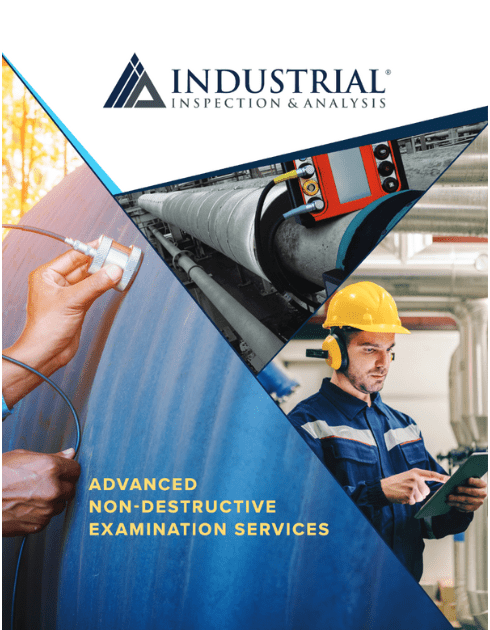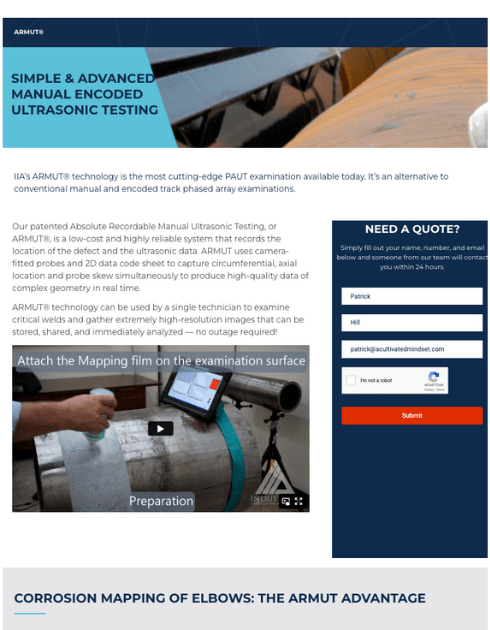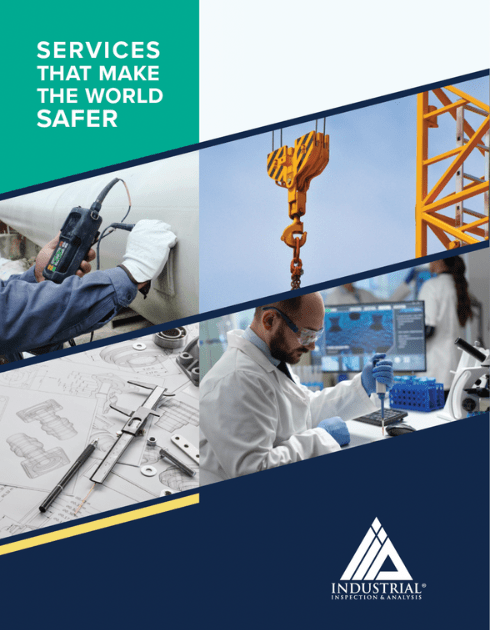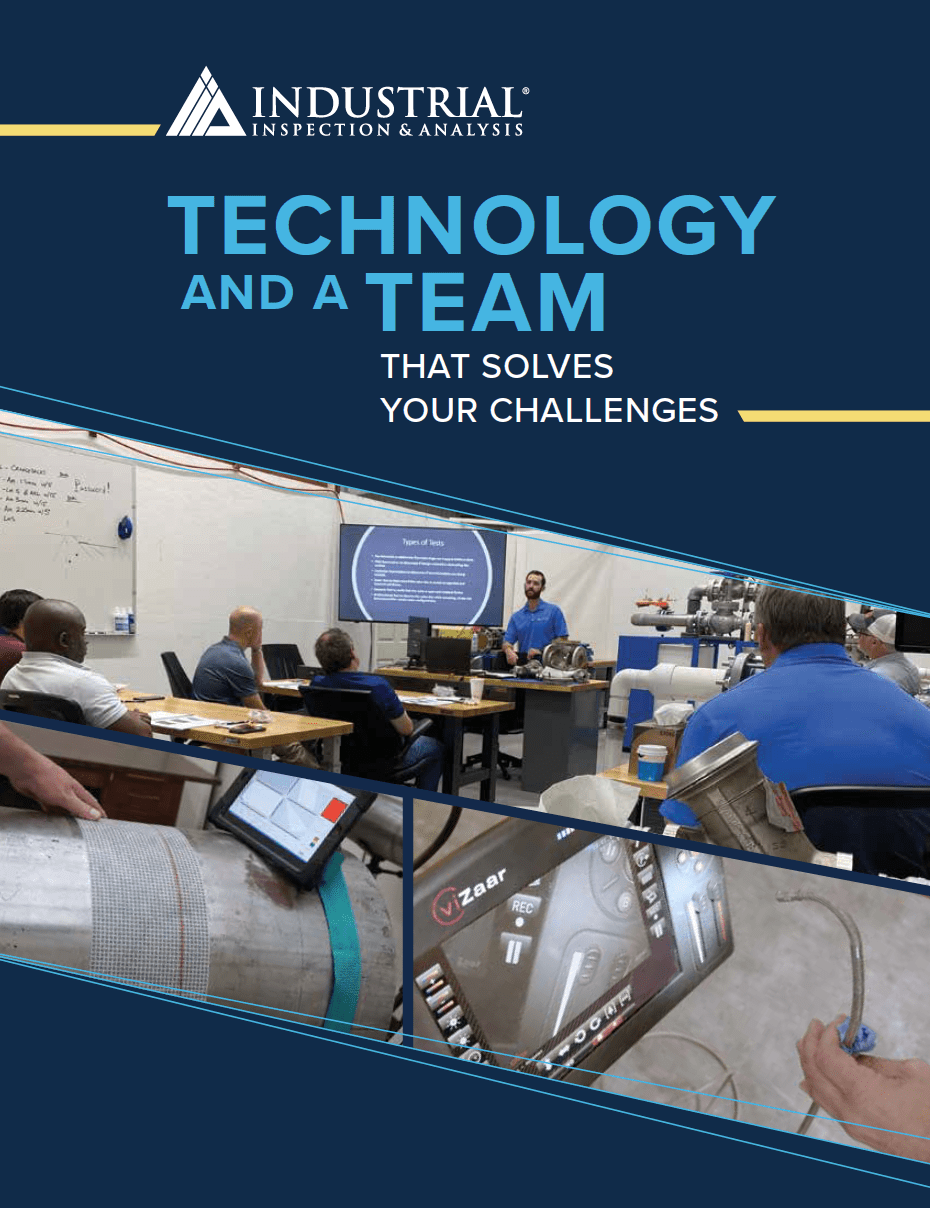IIA is the premier provider of advanced NDE services Advanced NDE Services
We are the premier provider of Advanced NDE services for the energy industry. We have vast experience and expertise providing weld quality inspection services (Xray, MT/PT, Phased Array Ultrasonics) for upstream, midstream and downstream providers.
Talk To An Expert
Don’t see exactly what you are looking for? Or maybe you do and want more specifics or an estimate. Either way, you can call us at
470-552-8301
right now or just fill out the form below and we will respond back within 24 hours.
Our Specializations
Automated corrosion mapping (internal)
This advanced ultrasonic technique uses an automatic scanner to assess the thickness of pipelines, pressure vessels and other critical equipment. The technology allows us to precisely map out and measure internal areas of corrosion.
Automated Corrosion Mapping Laser Profilometry (External)
For areas that cannot be accessed for manual examination, laser profilometry can be used to scan the surface of an object and quantify exterior roughness or cracks. This approach collects more data points and provides multiple views for analysis that can be helpful in determining if an indication is corrosion or a manufacturing defect. This inspection technique can increase the probability of detection and reduce inspection times from hours to minutes.
Computed radiography (CR)
IIA uses the smallest, lightest CR system designed specifically for non-destructive testing. Using direct input from mobile X-ray technicians, CR greatly increases the speed and efficiency of testing, while maintaining high levels of image quality and sensitivity. Images are processed in seconds, expediting weld approval and clearance. Images may be exported for immediate auditing or imported into CAD drawings for package detailing.
Full matrix capture (FMC)
This portable phased array ultrasonic testing technique provides more complete and reliable data by capturing every possible transmit-receive combination for a given transducer. FMC can improve inspection speed and accuracy and minimize the need for re-scans.
Guided wave testing (GWT)
Using rapid remote ultrasonic screening, guided wave testing identifies changes in a component’s cross section that could result in external and/or internal defects. This corrosion detection method is ideal for screening significant lengths of metallic pipelines or other hard-to-access areas in a pipeline system. Unlike conventional ultrasonic systems, GWT is capable of assessing areas several hundred feet away from the transducer.
Phased array UT (PAUT)
This advanced method of ultrasonic testing is used to determine component quality and detect flaws in manufactured materials, such as welds. In addition, PAUT can be effectively used for wall thickness measurements in conjunction with corrosion testing. This NDE technique can be deployed manually or automated, and it is minimally invasive, highly flexible, and offers multiple applications.
Conventional UT (shear wave)
Primarily used for weld inspections, shear wave testing uses a probe to direct ultrasonic beams toward the weld at an angle. This advanced testing technique is often required for inspections involving awkward weld geometry or where a weld crown or bead is present.
Pulsed eddy current array (PECA)
Pulsed eddy current array is a highly accurate technique to determine average wall thickness for any material that conducts electricity. PECA is best used as a screening technique; other methods are better suited for detecting isolated areas of corrosion.
Time of flight diffraction (TOFD)
This advanced technique is a sensitive and accurate nondestructive method used primarily to identify weld defects with extreme angles. TOFD is also effective in improving sizing accuracy of weld defects and detecting discontinuities such as cracks, lack of fusion and lack of penetration.
Our Advanced NDE offerings also include corrosion inspection services for buried pipelines and fixed equipment and remote visual inspection (RVI) services to support foreign object retrieval and remote access verification of pipe quality and cleanliness. Our expertise allows us to match the best NDE technicians and technologies to accomplish your goals and provide solutions to the most complex inspection challenges.
Other Services
- Advanced / Traditional Bell Hole Examinations
- Encoded Phased Array Weld Examination (Code Compliance)
- Post Weld Heat Treatment
- Corrosion Mapping
- Ferrite Testing
- Hardness Testing
- NDE Training
- Positive Material Identification (PMI)
- Program and Procedure Development
- Proprietary Technologies
- Phased Array Sectorial Scanning PASS® Valve Examinations
- Absolute Recordable Manual Ultrasonic Testing (ARMUT®)
- Precision Ultrasonic Testing
- Remote Visual Inspections (RVI)
- Weld Quality Inspection
Inspections Led by Level III Professionals
Our inspection teams are led by Level III NDE Professionals who have firsthand experience with the technology, as well as knowledge of the components under examination. In addition to practical experience, our Level III Professionals are proficient in the interpretation and application of relevant codes and standards. Our certification programs meet or exceed most industry requirements for NDE inspection personnel.
Consulting
IIA's unrivaled support to our customers is a result of more than three decades of industry experience applying NDE to pressure vessels and piping systems. From the earliest stages in manufacturing to the investigation of component failures, IIA offers a broad range of expertise.

Resources
Additional Resources
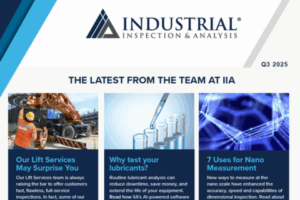
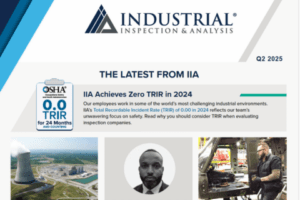
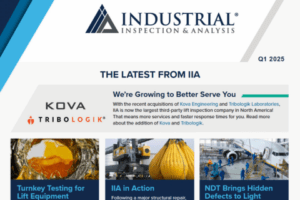
Certifications & Guidelines
- All Certifications Based on Guidelines in SNT-TC-1A
and CP189 - Texas Department of State Health Services – Radioactive Materials Licensing (MC 2835)
- New Mexico Environment Department Radioactive Material License
- In Line Inspection Validation
- American Welding Society
- Pressure Equipment Directive 2014/68/UE (European Certification)
- Pressure Equipment Regulations 1999
- ASNT Level III
- IRRSP

